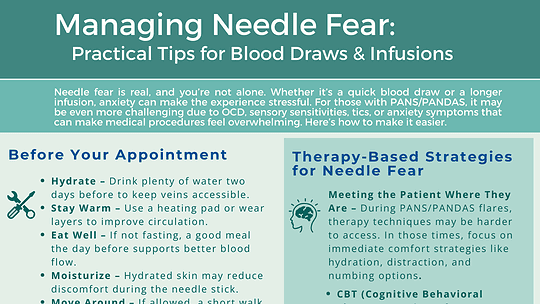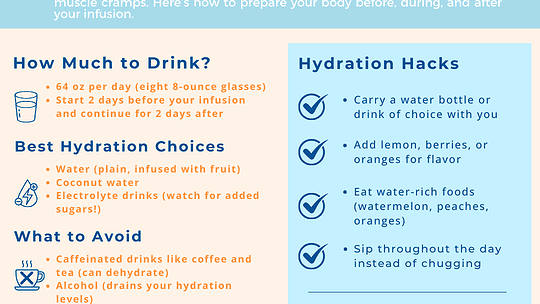
Managing Needle Fear: Practical Tips for Blood Draws & Infusions
Needle fear is real, and you’re not alone. Whether it’s a quick blood draw or a longer infusion, anxiety can make the experience stressful. For those with PANS/PANDAS, it may...

Needle fear is real, and you’re not alone. Whether it’s a quick blood draw or a longer infusion, anxiety can make the experience stressful. For those with PANS/PANDAS, it may...

Staying well-hydrated before, during, and after IVIG can help minimize side effects like headaches, dizziness, fatigue, and muscle cramps. Here’s how to make hydration work for you: Download...

Octapharma/PACE Foundation IVIG Trial Update: 6-26-24 Read the Announcement from the PACE Foundation. Given the recent changes posted on ClinicalTrials.Gov, we wanted to update...

In PANS patients, all pyschometric endpoints studied exhibited statistically significant decreases following 6 cycles (infusions) of IVIG as well as durability of response for up to 46 weeks in a...
Hajjari, P., Oldmark, M.H., Fernell, E. et al. Paediatric Acute-onset Neuropsychiatric Syndrome (PANS) and intravenous immunoglobulin (IVIG): comprehensive open-label trial in ten children. BMC Psychiatry 22, 535 (2022). https://doi.org/10.1186/s12888-022-04181-x
Conclusion: Considerable and pervasive improvements in symptoms and clinical impairments were seen in these ten children after three monthly IVIG treatments. Moderate to severe transient side effects occurred in three cases.
DIAGNOSTICS, DIFFERENTIAL DIAGNOSTICS AND TREATMENT OF PANDAS SYNDROME: DESCRIPTION OF THE CASE. Mukhtorjonova Khusnigul Nodirbekovna, Elmurodova Zarina Aslanovna. Matkarimova Dilnoza Doniyorovna, Tashkent Pediatric Medical Institute. ISSN: 2776-0960 Volume 2, Issue 6, June 2021
The analysis of this clinical case demonstrates the existence of a group of patients with a good therapeutic response to the administration of immunoglobulins and antibiotics. The mechanisms of development and course of this condition are not fully understood and require further research.

Join ASPIRE in donating plasma today to help minimize the shortage affecting PANS patients across the country. Donate plasma today! ASPIRE can help you set up the easiest plasma drive....
Chen, Renfen & Wei, Xiumei. (2021). The interference of laboratory tests by immunoglobulin infusion: Problems and solutions. Journal of Clinical Images and Medical Case Reports. 2. 10.52768/2766-7820/1047.

I’m sending out gift bags to other kids because I want to help make their experience during IVIg day a little better. If you know of someone getting IVIg, please contact me so that I can send them...

As evidenced by her recovery and resolution of symptoms, treating both the Lyme infection and streptococcal infection, as well as treating the underlying autoimmune etiology of her neuropsychiatric...

Note from ASPIRE: This is a must-read PANS PANDAS Patient Story. A typical happy young girl develops a severe eating disorder and other PANS PANDAS symptoms; then, she suffers through...

In response to the COVID-19, a global pandemic, that has affected all of our lives, ASPIRE is putting together a series of Q&As from a variety of professionals. We will be updating this resource...